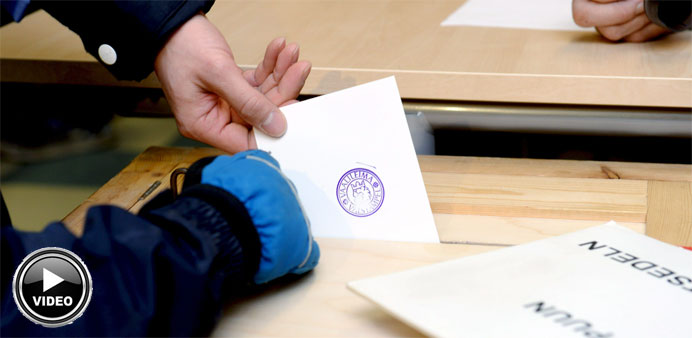AFP/ Helsinki
Public opinion polls have predicted a resounding victory for the liberal-agrarian Centre Party leader Juha Sipila, a 53-year-old IT millionaire and newcomer to politics.
Polling stations were to close at 8:00 pm (1700 GMT), when the results of advance voting -- by which more than one-third of the electorate cast their ballots -- were to be released.
Campaigning heavily on his business know-how, Sipila has vowed to get the economy back on track after three years of recession and stagnation, austerity and failed reforms.
"Our country deserves better," Sipila wrote on his blog Saturday. "Politics must be returned to a climate of trust."
Elected to parliament in 2011, Sipila became party leader in 2012 when he was still virtually unknown to most Finns.
Stubb's four-party left-right coalition has been mired in internal discord, preventing it from pushing through any real policy changes.
Finland was long a top performer in the eurozone, hailed by Germany and credit rating agencies for running a tight economic ship. But it has failed to adapt to a rapidly changing economic climate.
The two pillars of its economy, the forestry sector and technology industry led by one-time giant Nokia, have shrunk dramatically, while two of Finland's biggest trading partners, Russia and the eurozone, are slogging through their own economic woes.
Unemployment is at its highest level since 2003, at 9.2 percent.
The Centre Party, in opposition since 2011 and which has fostered 12 prime ministers, has recently been credited with around 24 percent support.
"The main point in this election is the bad economic situation in Finland, so I voted for people I believe are experts in the economy," 64-year-old Jorma Mahonen said after casting his ballot in Helsinki.
Rafael Donner, 25, was pessimistic.
"I don't think this election is going to change much. Society won't accept that GDP can't grow forever," he said.
"I believe we in Finland have enough. I look at my friends and they all have iPhones, go on holiday to nice places, and have brunches every weekend."
If a Centre victory is confirmed, Sipila's first task will be to pick his coalition partners. Tradition dictates that the largest party takes the post of prime minister and forms a government with the other largest parties to obtain a majority in parliament.
Several weeks of thorny negotiations are expected before Sipila is able to present a coalition.
Faced with Finland's economic woes, "the government programme will be quite difficult to create," Helsinki University political history professor Juhana Aunesluoma predicted.
Three parties are fighting for second place, hovering between 14 and 17 percent in the polls: Stubb's conservative National Coalition Party, the Social Democrats and the right-wing eurosceptic Finns Party.
- 'Need bold solutions' -
Sipila has not revealed which parties he would like to see join his future coalition.
"We need... new entrepreneurship and new jobs in the whole of Finland. We need bold solutions (and) goal-oriented leadership," Sipila said.
He has vowed to create 200,000 private sector jobs in 10 years.
The vote will be closely watched in Brussels: the Centre has a strong eurosceptic faction, and the Finns Party is fiercely opposed to what it considers interference in Finnish affairs.
"The eurozone is at the moment a catastrophe," Finns Party leader Timo Soini, who is gunning to be a government minister, told AFP in an interview.
"Greece should get out of the euro and devaluate the drachma and get their economy on its feet again and maybe later join (the euro) again," he said.
Stubb, who has held the government reins since June, was optimistic on the eve of the vote as a projection put his party in second place with 16.8 percent.
"I still believe in the gold medal," he wrote.
None of the main party leaders made any comments on Sunday as they cast their ballots, while Sipila had voted in advance.

